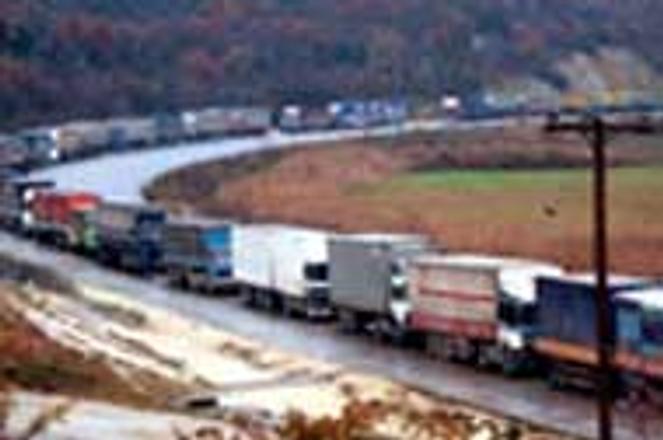The long haul. Five kilometer queues of trucks at the Slovak border have become an uncommon sight since a customs office amendment raising the value limit of imports allowed in without red tape took effect on Jan. 1.photo: TASR
Diplomats and business leaders are delighted by a recent easing of Slovak import restrictions which once made importing even the cheapest goods into Slovakia a paperwork nightmare.
On February 3, Juraj Mihálik, director of the Slovak Customs Directorate, told The Slovak Spectator that the value limit for goods which need full import paperwork and certification has been raised to 1,000 Slovak crowns ($26.39) effective January 1. The move makes it substatially easier to import goods to Slovakia, as the old system required that any import worth over $1 be fully certified by customs officials and bureaucrats.
"Any shipment under 1,000 Sk now needs only an invoice," Mihálik said.
Mihálik boasted that the move has now catapulted the Slovak Republic ahead of its eastern European neighbours in its conformity with EU regulations. "The Slovak customs office now has the same conditions as does the EU. We are more in line with EU legislation than Poland, Hungary, and the Czech Republic. We implement rules quicker than they do," he said.
The move has drawn a positive response from the American Embassy. Mark Bocchetti, the Economic - Commercial Officer at the US embassy in Bratislava, said that the move would benefit not only the business community, but the citizens of Slovakia as well. "By cutting down on unnecessary paperwork, [the government has made] it easier and cheaper to ship low-value items into Slovakia. This benefits the business community, both Slovak and foreign," he said.
Bocchetti also noted that "less paperwork also frees up valuable staff time at the customs office, allowing them to concentrate their efforts on more important issues, such as preventing the shipment of narcotics or other illicit items. This benefits the citizens of Slovakia. For these two reasons, the measure is significant."
DHL general manager Robert Paterson was also pleased by the move and had high praise for the decision. "This is a very significant change," he said. "Everything that they said they were going to do, they have done. This puts Slovakia ahead of any other eastern European country, including Hungary and the Czech Republic."
Reacting to criticism
The move came after heavy scrutiny of Slovak import restrictions and certification policies by the international community in recent months.
Peter Mihók, president of the Slovak Chamber of Commerce, warned in December that confusing import standards had created a negative image of the country. "Investors do not know what new restrictions may be introduced. This is not a good business card for a country," he said.
DHL's Paterson had also criticised the previous Slovak import value limit of $1. "To my knowledge, Slovakia has the lowest value limit in the world," he complained before Christmas.
The move has already had a measurable effect on DHL's business. "The new value limit has effectively reduced our workload by 40%," said Paterson, adding that as a result, DHL had decided to begin shipping directly into Bratislava's M.R. Štefánik International Airport instead of relying on Vienna's larger Schwechat International Airport.
"I am 90-95% sure that we will now fly directly into Bratislava. It will be a very significant investment. If we could, we'd start next week, but it will start by the end of this year without a doubt," he effused.
As for the effect that the move will have on foreign investment, opinions are divided. Paterson stated simply that "when you fix [problems with] imports, exports will increase." Bocchetti, on the other hand, responded more conservatively. "This improvement is not likely to have an immediate, direct impact on foreign investment."
However, Bocchetti conceded that "it does improve the business climate, and an improved business climate in the end will generate more foreign investment."
The certification hurdle
Now that the value limit has been raised, Slovakia's byzantine import certification procedures are next on the agenda.
Conceived as a means of controlling the flood of import-export companies that arrived following the end of communism in 1989, import certificates now represent a serious nuisance to importers who say the safety and quality of their goods have already been vouched for by international certification agencies.
Criticism of the certification procedures has come from many quarters, including diplomatic. U.S. Ambassador to Slovakia Ralph Johnson, during a speech to the American Chamber of Commerce on October 19, 1998, called import restrictions "a non-tariff barrier and an open invitation to corruption."
"The next move is the removal of excessive certification," agreed Paterson, claiming he felt optimistic that the change would come. "I have a strong suspicion that it will happen."
But Mihálik said that progress had so far been slow. "We would be glad to get rid of excessive certification," he said, "but the Ministry of Finance must make the legislative changes. We have asked them to omit the certification, but their response was negative."


